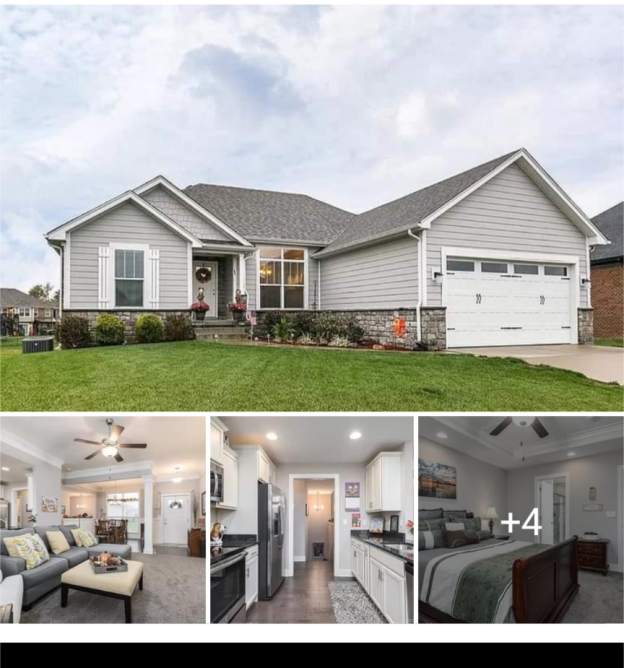The more you know about our home loan program, the more you will realize how little “red tape” there really is in getting a Kentucky VA loan. These loans are often made without any down payment at all, and frequently offer lower interest rates than ordinarily available with other kinds of loans. Aside from the veteran’s certificate of eligibility and the VA-assigned appraisal, the application process is not much different than any other type of mortgage loan. If the lender is approved for automatic processing, as more and more lenders are now, a buyer’s loan can be processed and closed by the lender without waiting for VA’s approval of the credit application.
Additionally, if the lender is approved under VA’s Lender Appraisal Processing Program (LAPP), the lender may review the appraisal completed by a VA-assigned appraiser and close the loan on the basis of that review. The LAPP process can further speed the time to loan closing.
5 Easy Steps To A Kentucky VA Loan
Apply for a Certificate of Eligibility.
A veteran who doesn’t have a certificate can obtain one easily by making application on VA Form 26-1880, Request for Determination of Eligibility and Available Loan Guaranty Entitlement, to the local VA office.
Decide on a home you want to buy and sign a purchase agreement.
Order an appraisal from VA. (Usually this is done by the lender).
Most VA regional offices offer a “speed-up” telephone appraisal system. Call the regional VA office for details. See also How To Get a VA Loan.
Apply to a mortgage lender for the loan.
While the appraisal is being done, the lender (mortgage company, savings and loan, bank, etc.) can be gathering credit and income information. If the lender is authorized by VA to do automatic processing, upon receipt of the VA or LAPP appraised value determination, the loan can be approved and closed without waiting for VA’s review of the credit application. For loans that must first be approved by VA, the lender will send the application to the local VA office, which will notify the lender of its decision.
Close the loan and move in.
Kentucky VA Financing – A Good Deal For Kentucky Veterans
More than 29 million veterans and service personnel are eligible for VA financing. Even though many veterans have already used their loan benefits, it may be possible for them to buy homes again with VA financing using remaining or restored loan entitlement.
Before arranging for a new mortgage to finance a home purchase, veterans should consider some of the advantages of Kentucky VA home loans:
Most important consideration, no down payment is required in most cases.
Loan maximum may be up to 100 percent of the VA-established reasonable value of the property.
Flexibility of negotiating interest rates with the lender
No monthly mortgage insurance premium to pay.
limitation on buyer’s closing costs.
An appraisal which informs the buyer of property value.
Thirty year loans with a choice of repayment plans:
traditional fixed payment (constant principal and interest; increases or decreases may be expected in property taxes and homeowner’s insurance coverage);
An assumable mortgage, subject to VA approval of the assumer’s credit.
Right to prepay loan without penalty.
VA performs personal loan servicing and offers financial counseling to help veterans avoid losing their homes during temporary financial difficulties.
What Is A Kentucky VA-Guaranteed Loan?
These loans are made by a lender, such as a mortgage company, savings and loan, credit union or bank. VA’s guaranty on the loan protects the lender against loss if the payments are not made, and is intended to encourage lenders to offer veterans loans with more favorable terms. The amount of guaranty on the loan depends on the loan amount and whether the veteran used some entitlement previously. With the current maximum guaranty, a veteran who hasn’t previously used the benefit may be able to obtain a Kentucky VA loan up to $484,500 depending on the borrower’s income level and the appraised value of the property. The local VA office can provide more details on guaranty and entitlement amounts.
What Can A Kentucky VA Loan Be Used For?
To buy a home, including townhouse or condominium unit in a VA-approved project.
To build a home.
To simultaneously purchase and improve a home.
To improve a home by installing energy-related features such as solar or heating/cooling systems, water heaters, insulation, weather-stripping/caulking, storm windows/doors or other energy efficient improvements approved by the lender and VA. These features may be added with the purchase of an existing dwelling or by refinancing a home owned and occupied by the veteran. A loan can be increased up to $3,000 based on documented costs or up to $6,000 if the increase in the mortgage payment is offset by the expected reduction in utility costs. A refinancing loan may not exceed 90 percent of the appraised value plus the costs of the improvements. Check with a lender or VA for details.
To refinance an existing home loan up to 90 percent of the VA-established reasonable value or to refinance an existing VA loan to reduce the interest rate.
To buy a manufactured home and/or lot.
VA Loans – Who Is Eligible?
Veterans with active duty service, that was not dishonorable, during World War II and later periods are eligible for VA loan benefits. World War II (September 16, 1940 to July 25, 1947), Korean conflict (June 27, 1950 to January 31, 1955), and Vietnam era (August 5, 1964 to May 7, 1975) Veterans must have at least 90 days’ service. Veterans with service only during peacetime periods and active duty military personnel must have had more than 180 days’ active service. Veterans of enlisted service which began after September 7, 1980, or officers with service beginning after October 16,1981, must in most cases have served at least 2 years.
Persian Gulf Conflict
Basically, reservists and National Guard members who were activated on or after August 2, 1990, served at least 90 days and were discharged honorably are eligible. VA regional office personnel may assist with eligibility questions.
Selected Reserve
Members of the Selected Reserve, including National Guard, who are not otherwise eligible and who have completed 6 years of service and have been honorably discharged or have completed 6 years of service and are still serving may be eligible. The expanded eligibility for Reserves and National Guard individuals will expire October 28, 1999. Contact the local VA office to find out what is needed to establish eligibility. Reservists will pay a slightly higher funding fee than regular veterans. (See paragraph entitled “Costs of Obtaining a VA Loan” in How to Get a VA Loan).
Had A VA Loan Before?
Remaining Entitlement
Veterans who had a VA loan before may still have “remaining entitlement” to use for another VA loan. The current amount of entitlement available to each eligible veteran is $36,000. This was much lower in years past and has been increased over time by changes in the law. For example, a veteran who obtained a $25,000 loan in 1974 would have used $12,500 guaranty entitlement, the maximum then available. Even if that loan is not paid off, the veteran could use the $23,500 difference between the $12,500 entitlement originally used and the current maximum of $36,000 to buy another home with VA financing. An additional $14,750, up to a maximum entitlement of $50,750 is available for loans above $144,000 to purchase or construct a home.
Most lenders require that a combination of the guaranty entitlement and any cash down payment must equal at least 25 percent of the reasonable value or sales price of the property, whichever is less. Thus, in the example, the veteran’s $23,500 remaining entitlement would probably meet a lender’s minimum guaranty requirement for a no down payment loan to buy a property valued at and selling for $94,000. The veteran could also combine a down payment with the remaining entitlement for a larger loan amount.
Restoration of Entitlement
Veterans can have previously-used entitlement “restored” to purchase another home with a VA loan if:
The property purchased with the prior VA loan has been sold and the loan paid in full, or
A qualified veteran-transferee (buyer) agrees to assume the VA loan and substitute his or her entitlement for the same amount of entitlement originally used by the veteran seller. The entitlement may also be restored one time only if the veteran has repaid the prior VA loan in full but has not disposed of the property purchased with the prior VA loan. Remaining entitlement and restoration of entitlement can be requested through the nearest VA office by completing VA Form 26-1880.
How To Get A Kentucky VA Loan
VA Appraisal – Certificate of Reasonable Value
The CRV (Certificate of Reasonable Value) is based on an appraiser’s estimate of the value of the property to be purchased. Because the loan amount may not exceed the CRV, the first step in getting a VA loan is usually to request an appraisal. Anyone (buyer, seller, real estate personnel or lender) can request a VA appraisal by completing VA Form 26-1805, Request for Determination of Reasonable Value. After completing the form, it can either be mailed to the Loan Guaranty Division at the nearest VA office for processing or an appraisal can be requested by telephoning the Loan Guaranty Division for assignment of an appraiser. The local VA office may be contacted for information concerning its assignment procedures. The appraiser will send a bill for his or her services to the requester according to a fee schedule approved by VA. To simplify things, VA and HUD/FHA (Department of Housing and Urban Development/Federal Housing Administration) use the same appraisal forms. Also, if the property was recently appraised under the HUD procedure, under certain limited circumstances, the HUD conditional commitment can be converted to a VA CRV. The local VA office can explain how this is done.
It is important to recognize that while the VA appraisal estimates the value of the property, it is not an inspection and does not guarantee that the house is free of defects. Homebuyers should be encouraged to carefully inspect the property themselves, or to hire a reputable inspection firm to help in this area. VA guarantees the loan, not the condition of the property.
Application
The application process for VA financing is no different from any other type of loan. In fact, the VA application form is the same as that used for HUD/FHA and Conventional loans. The mortgage lender verifies the applicant’s income and assets, and obtains a credit report to see that other obligations are being paid on time. If all is well and the appraised value of the property is enough to cover the loan needed, the lender, in most instances, can then close the loan under VA’s automatic procedure. Only about 5 percent of VA loan applications have to be submitted to a VA office for approval before closing.
Requirements For Loan Approval
To obtain a VA loan, the law requires that:
The applicant must be an eligible veteran who has available entitlement.
The loan must be for an eligible purpose.
The veteran must occupy or intend to occupy the property as a home within a reasonable period of time after closing the loan.
The veteran must be a satisfactory credit risk.
The income of the veteran and spouse, if any, must be shown to be stable and sufficient to meet the mortgage payments, cover the costs of owning a home, take care of other obligations and expenses, and have enough left over for family support.
An experienced mortgage lender will be able to discuss specific income and other qualifying requirements.
Costs Of Obtaining A VA Loan
Funding Fee
The Funding Fee is calculated by looking at 5 different factors: Loan amount, loan type (Purchase or Refinance), type of service, down payment (if any) and prior VA loan use. Take a look at the charts below to see how the va funding fee varies based on these factors.
FUNDING FEES AFTER 1/1/2020
The VA funding fee is calculated as a percentage of the total loan amount. It must be paid or rolled into the loan at closing time. VA strongly recommends that you verify with your lender that the funding fee matches your military service.
In Public Law 116-23, Congress has established rates for loans closed on or after January 1, 2020, and before January 1, 2022 at the levels listed below:
The following do NOT pay the VA funding fee:
- Veteran receiving VA compensation for a service-connected disability;
- Veteran entitled to receive VA compensation for a service-connected disability, but receives retirement pay or active service pay;
- Surviving spouse of a Veteran who died in active service or from a service-connected disability;
- Servicemember on Active Duty who provides, on or before date of loan closing, evidence of having been awarded the Purple Heart.
Other Closing Costs
Reasonable closing costs may be charged by the lender. These costs may not be included in the loan. The following items may be paid by the veteran purchaser, the seller, or shared. Closing costs may vary among lenders and also throughout the nation because of differing local laws and customs.
VA Appraisal
Credit Report
Loan Origination Fee (usually 1 percent of the loan)
Discount Points
Title Search and Title Insurance
Recording Fees
State and/or Local transfer Taxes, if applicable
Survey
No commissions, brokerage fees or “buyer broker” fees may be charged to the veteran buyer.
Kentucky VA Loans – Need More Information?
Veterans seeking more detailed information concerning the VA home loan program may request VA Pamphlet 26-4, VA-Guaranteed Home Loans for Veterans, or VA Pamphlet 26-6, To the Home-Buying Veteran, from the nearest VA office. Loan Guaranty personnel at that office will also be pleased to answer specific questions and provide any other assistance they can.
Remember, VA-guaranteed financing is a benefit which Congress intended eligible veterans should have. If you are a veteran homebuyer or know of one, it makes sense to look into the VA loan program as a good way to finance a home purchase.
Related Articles
- Guide to Kentucky VA Loans (kentuckyvaloan.wordpress.com)
- Kentucky VA Home Loans Approval Criteria (kentuckyvaloan.wordpress.com)
- Kentucky VA Funding Fee
- Kentucky VA Home Loan Credit Issues
- Kentucky VA Loan Credit Score Requirements
- Kentucky VA Loan Guidelines
- Kentucky VA Loan Requirements
- Kentucky VA Refinance Guidelines
If you have questions about qualifying as first time home buyer in Kentucky, please call, text, email or fill out free pre-qualification below for your next mortgage loan pre-approval.
Text or call phone: (502) 905-3708




Pingback: Kentucky VA Mortgage Loan Guide for Foreclosures, Bankruptcy, and short sales or deed in lieu. – Louisville Kentucky Mortgage Loans
Pingback: How to Apply for a Kentucky VA Loan – Louisville Kentucky Mortgage Loans
Pingback: How to Apply for a Kentucky VA Loan | Kentucky FHA Mortgage Loans
Youre so right. Im there with you. Your weblog is undoubtedly worth a read if anybody comes across it. Im lucky I did simply because now Ive got a whole new view of this. I didnt realise that this problem was so crucial and so universal. You certainly put it in perspective for me.
Pingback: Cheap Investors Houses!
hey there and thanks in your information ? I have definitely picked up something new from right here. I did however expertise several technical points the usage of this website, since I experienced to reload the site a lot of times previous to I may just get it to load correctly. I have been considering in case your hosting is OK? No longer that I’m complaining, but sluggish loading cases instances will sometimes impact your placement in google and could damage your high-quality ranking if advertising and marketing with Adwords. Well I’m adding this RSS to my email and can look out for much more of your respective interesting content. Make sure you replace this again very soon..
Pingback: Buy Guaranteed Facebook Fans
Pingback: Louisville Kentucky VA Mortgage « Kentucky VA Mortgage Home Lender